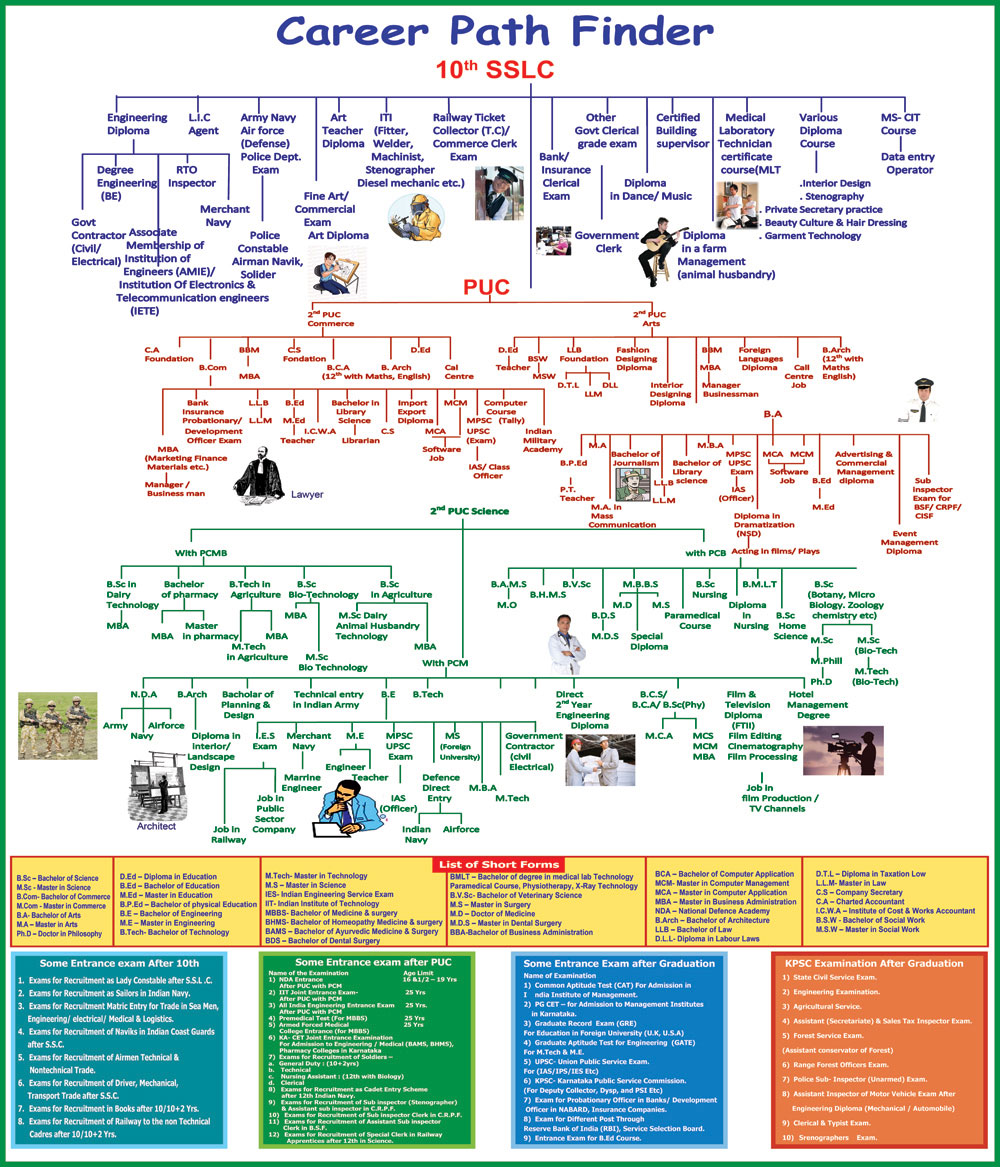Table of Contents
various streams after 10th or options available to students in India after completing the 10th class, categorized by different fields of study:
Streams after 10th grade
Science Stream:
Engineering: Pursue a Diploma or Bachelor’s degree in various branches such as Mechanical Engineering, Electrical Engineering, Computer Science Engineering, Civil Engineering, etc.
Medical: Prepare for medical entrance exams like NEET (National Eligibility cum Entrance Test) and pursue MBBS (Bachelor of Medicine, Bachelor of Surgery), BDS (Bachelor of Dental Surgery), or other medical-related courses.
Non-Medical: Focus on subjects like Physics, Chemistry, Mathematics, and Computer Science to pursue careers in engineering, technology, or research.
Robotics: Explore specialized courses or programs in Robotics Engineering, Mechatronics, or related fields offered by certain colleges/universities or technical institutions.
Commerce Stream:
Chartered Accountancy (CA): Prepare for the CA entrance exam conducted by the Institute of Chartered Accountants of India (ICAI) to become a Chartered Accountant.
Company Secretary (CS): Pursue the Company Secretary course offered by the Institute of Company Secretaries of India (ICSI) to become a Company Secretary.
Bachelor of Commerce (B.Com): Pursue a Bachelor’s degree in Commerce with specializations like Finance, Accounting, Banking, etc.
Bachelor of Business Administration (BBA): Opt for a Bachelor’s degree in Business Administration focusing on management and business-related subjects.
Humanities Stream:
Bachelor of Arts (BA): Pursue a Bachelor’s degree in Arts with specializations in subjects like History, Geography, Political Science, Economics, Sociology, Psychology, Literature, etc.
Bachelor of Fine Arts (BFA): Explore artistic pursuits with a Bachelor’s degree in Fine Arts focusing on areas like painting, sculpture, photography, etc.
Law: Prepare for law entrance exams like CLAT (Common Law Admission Test) and pursue a Bachelor’s degree in Law (LLB) to become a lawyer.
Journalism and Mass Communication: Pursue courses in Journalism, Mass Communication, Media Studies, etc., to enter the field of media and communication.
Other Streams/Options:
Vocational Courses: Exploring streams after 10th as various vocational courses offered by vocational training institutes or polytechnics in fields like hospitality, tourism, fashion designing, culinary arts, etc.
For example : Students opting for the commerce stream out of the available Streams after 10th in India typically pursue a 2-year pre-university course (PUC) or its equivalent, followed by a Bachelor of Commerce (B.Com) degree. Here’s a detailed overview of the typical programs and courses students can pursue after the 10th grade in the commerce stream:
1. Pre-University Course (PUC) or 11th and 12th Grade:
First Year (11th Grade):
Core Subjects:
Accountancy: Introduces fundamental accounting principles, recording of transactions, preparation of financial statements, and analysis of financial data.
Business Studies: Covers basic concepts of business management, organizational structure, functions of management, marketing, finance, and entrepreneurship.
Economics: Introduces students to microeconomics and macroeconomics, covering topics such as demand and supply, consumer behavior, production, national income, inflation, unemployment, etc.
Optional Language: Students usually have the option to choose an additional language course such as English, Hindi, or a regional language.
Second Year (12th Grade):
Core Subjects:
Accountancy: Builds upon concepts learned in the first year, covering advanced topics such as partnership accounts, company accounts, financial statement analysis, and accounting standards.
Business Studies: Expands on business management concepts, including planning, organizing, directing, controlling, business environment, business finance, and marketing management.
Economics: Continues with the study of microeconomics and macroeconomics, exploring topics such as market structures, national income determination, monetary and fiscal policy, international trade, etc.
Optional Language: Students continue with the optional language course.
Elective Subjects:
Students may have the option to choose elective subjects based on their interests and career goals, such as Mathematics, Computer Science, Informatics Practices, etc.
2. Bachelor of Commerce (B.Com) Degree Program:
First Year:
Foundation Courses:
Financial Accounting: Expands on concepts learned in PUC, covering advanced topics in financial accounting, cost accounting, and management accounting.
Business Law: Introduces students to various business laws such as the Indian Contract Act, Sale of Goods Act, Partnership Act, Companies Act, etc.
Business Mathematics and Statistics: Focuses on mathematical techniques and statistical tools used in business decision-making, including topics like calculus, probability, hypothesis testing, correlation, regression, etc.
Core Subjects:
Principles of Management: Covers principles and functions of management, organizational behavior, leadership, motivation, communication, and decision-making.
Corporate Accounting: Focuses on advanced topics in corporate accounting, including preparation of company final accounts, cash flow statements, financial statement analysis, accounting for shares, debentures, etc.
Second Year:
Core Subjects:
Cost Accounting: Explores costing methods, cost-volume-profit analysis, budgeting, standard costing, variance analysis, and decision-making using cost data.
Income Tax Law: Introduces students to the basic provisions of income tax law in India, computation of taxable income, tax deductions, exemptions, filing of tax returns, etc.
Auditing: Covers principles and practices of auditing, including audit planning, risk assessment, internal control evaluation, audit evidence, and reporting.
Elective Subjects:
Students may have the option to choose elective subjects based on their interests or specialization areas such as finance, marketing, human resource management, taxation, etc.
Third Year:
Core Subjects:
Financial Management: Covers topics such as capital budgeting, cost of capital, capital structure, working capital management, dividend policy, and financial analysis.
Business Communication: Focuses on improving written and oral communication skills essential for effective business communication, including business correspondence, report writing, presentation skills, and interpersonal communication.
Specialization Courses:
Depending on the university or college, students may have the option to specialize in areas such as finance, accounting, taxation, marketing, human resource management, or international business by selecting elective courses in their area of interest.
Project Work/Internship:
Many B.Com programs include a project work component or internship where students are required to undertake a research project or gain practical experience through an internship in a business organization.
Assessment and Evaluation:
Assessment methods typically include a combination of written examinations, assignments, projects, presentations, and practical exercises.
Final year students may be required to submit a dissertation or project report based on their research findings or internship experience.
Completing a Bachelor of Commerce (B.Com) degree equips students with the knowledge, skills, and competencies necessary to pursue careers in commerce, accounting, finance, business management, or related fields, or to further their education through postgraduate studies or professional certifications like Chartered Accountancy (CA), Company Secretary (CS), or Chartered Financial Analyst (CFA).

Streams after 10th can lead you to work with the companies given below after completing the further studies.
Type of company offer’s Jobs:
Companies across various sectors offer employment opportunities to candidates from different streams based on their qualifications, skills, and interests. Here are some examples of companies that commonly hire candidates from different streams:
1. Information Technology (IT) and Software Services:
Tata Consultancy Services (TCS)
Infosys
Wipro
Accenture
IBM
Capgemini
Tech Mahindra
Cognizant
2. Banking, Financial Services, and Insurance (BFSI):
State Bank of India (SBI)
ICICI Bank
HDFC Bank
Axis Bank
Kotak Mahindra Bank
Bank of Baroda
Insurance companies like LIC, ICICI Prudential, HDFC Life, etc.
3. Retail and E-Commerce:
Amazon
Flipkart
Reliance Retail
Future Group
Aditya Birla Retail
Tata Group (Tata Cliq)
4. Fast-Moving Consumer Goods (FMCG) and Consumer Durables:
Hindustan Unilever Limited (HUL)
Procter & Gamble (P&G)
Nestle India
ITC Limited
Marico Limited
Samsung
LG Electronics
5. Manufacturing and Engineering:
Tata Motors
Mahindra & Mahindra
Bharat Heavy Electricals Limited (BHEL)
Larsen & Toubro (L&T)
Godrej & Boyce
Siemens
Thermax
6. Consulting and Professional Services:
Deloitte
PricewaterhouseCoopers (PwC)
Ernst & Young (EY)
KPMG
McKinsey & Company
Boston Consulting Group (BCG)
7. Healthcare and Pharmaceutical:
Apollo Hospitals
Fortis Healthcare
Sun Pharmaceutical Industries
Dr. Reddy’s Laboratories
Cipla
GlaxoSmithKline Pharmaceuticals
8. Media and Entertainment:
The Walt Disney Company (India)
Sony Pictures Networks India
Zee Entertainment Enterprises
Viacom18
Star India
Times Group
9. Education and Training:
BYJU’S
Unacademy
WhiteHat Jr.
Meritnation
FIITJEE
Allen Career Institute
Resonance
These are just a few examples of companies that hire candidates from various streams. Many companies offer diverse job roles across different functions such as finance, human resources, marketing, operations, research and development, sales, information technology, consulting, etc., providing opportunities for candidates with different educational backgrounds to pursue rewarding careers in their respective fields.

